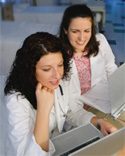| HSC 1000: () Offerings |
| This course provides incoming freshmen pre-nursing students skills that support course work in the sciences, specifically chemistry. It specifically addresses time management, note-taking skills, exam strategies, learning style, and University and chemistry program resources. May be repeated for credit up to 6 credits. |
|
|
|
| HSC 1100: () Offerings |
| The focus of this course is on the developmental practice of scientific reasoning. In this hands on course, some emphasis will be placed on computation (math) and experimentation (science); however the primary focus is on the use of interpretive frameworks to respond to evidence or information in order to answer questions in the sciences. Using both individual and small group learning strategies participants will learn how to make a claim, identify data that supports the claim and determine the reliability and validity of the data. |
|
|
|
| HSC 2000: () Offerings |
| This course provides prenursing students taking Biology courses with study skills that support their coursework. The course will address note-taking skills, exam strategies, and University and Biology program resources. May be repeated for credit up to 6 credits. |
|
|
|
| HSC 3000: () Offerings |
| Examines selected issues in women's health care in the context of women's lived experiences, including women's health care issues within the existing health care system, ways to reclaim and reshape gynocentric care for themselves, and sociopolitical activities that facilitate health care for all women. Global health care will be addressed with SPU mission to engage the culture. |
| Equivalent Courses:WST 3000
Attributes:Upper-Division
|
|
| HSC 3035: () Offerings |
| Introduces basic aspects of human sexuality: biologically how the reproductive system works; psychologically how males and females view their sexuality; and sociologically how sexual values and behavior affect the society as a whole. Christian perspectives will be related to the development of sexual values. |
| Attributes:Upper-Division
Restrictions:Freshman students are excluded. |
|
| HSC 3395: () Offerings |
| Examines perspectives on differing health care philosophies and practices in the United States and other countries. Explores trends, current events, and technology. Presentations are given by health care providers and consumers from the community. |
| Attributes:Upper-Division
|
|
| HSC 4044: () Offerings |
| Promotes the conceptual understanding of the basic statistical procedures used in research. Helps participants achieve those computational skills needed to carry out statistical procedures in practical settings and the use of the computer in data analysis. |
| Attributes:Mathematics (MAT), Upper-Division
Restrictions:Applied Human Biology, Biology, Cellular and Molecular Biology, Ecology, Exercise Science, Food and Nutritional Sciences, Nursing-INT, Physiology Majors only. |
|
| HSC 4391: () Offerings |
| Selected topics of human pathophysiology are investigated from the perspective of how various stressors and adaptive responses affect levels of wellness. These include normal as well as aberrant cell genesis; protective, resistive, and adaptive mechanisms; phases of pathologic changes; related clinical findings; and the influence of current interventions. |
| Attributes:Upper-Division
Restrictions:Nursing Majors only. Post-Baccalaureate, Senior students only. |
|
| HSC 4700: () Offerings |
| This course focuses on current issues in global health care as well as methods for addressing global inequities in health. Specific topics include: inter-relationships between health, poverty, and violence; development and foreign aid; forces of health disparities; and ethics, human rights, and Christianity. |
| Attributes:Upper-Division
Restrictions:Global Development Studies Majors only. Freshman students are excluded. |
|
| HSC 4900: () Offerings |
| Independent Study May be repeated for credit up to 15 credits. |
| Attributes:Upper-Division
|
|
| HSC 4940: () Offerings |
| Internship May be repeated for credit up to 5 credits. |
| Attributes:Upper-Division
|
|
| HSC 4950: () Offerings |
| Focuses on emerging and specialized topics in health care. May be repeated for credit up to 10 credits. |
| Attributes:Upper-Division
|
|
|
